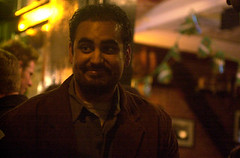My how times have changed
If there's one thing I've learned in my short lifetime and in my even shorter professional life, it's that everything changes. No matter what you think can't be changed, will in all probability, change.
Just thinking back at some of the things I used to believe, some examples of which I'm sure you can find by digging back in this blog, and seeing how much I've changed my ideas and convictions in just a few years, it surprises me. I can remember having debates, well debates is a strong word, with Ryan at SJSU about the future. I reasoned that print would be around in some form because there's just something about holding that copy in your hand over your bowl of cereal. Ryan wasn't so sure (but you already know that). Now I'm not so sure either.
Looking at the advances in ePaper and devices like ultra-portable net-centric laptops, the iPhone, Amazon's Kindle 2.0, Google's Android cellphone OS and a slew of other products that have brought about a new age of personalized communication on the go and it's hard to argue that we still need a printed version of a daily newspaper.
My how times have changed.
Back in 1981, a group of newspapers were sure online news was nothing but a curiosity.
It's funny to look at that video today knowing all that we know now. Online has pretty much taken over. And why not? It makes perfect sense. Even within our own industry's past we've seen this before. When TV news emerged as a new medium the afternoon newspaper was under attack then, just as morning print is battling online news now.
It happened then, and most likely it's going to happen again.
“We’re not in it to make money. We’re probably not going to lose a lot, but we aren’t gonna make much either,” said David Cole, San Francisco Examiner, in the report.
My how times have changed.
But, there's hope still. The medium is changing, but there's still a hunger for good reporting and news.
I know blogs, Google news (which doesn't do anything but link users to your site), Criagslist, Twitter and blah blah get a lot of the blame, but if you really think about it, those guys have nothing to talk about without reporters and photographers providing them with the news.
There will always be a need and demand for good journalist and journalism.
Just thinking back at some of the things I used to believe, some examples of which I'm sure you can find by digging back in this blog, and seeing how much I've changed my ideas and convictions in just a few years, it surprises me. I can remember having debates, well debates is a strong word, with Ryan at SJSU about the future. I reasoned that print would be around in some form because there's just something about holding that copy in your hand over your bowl of cereal. Ryan wasn't so sure (but you already know that). Now I'm not so sure either.
Looking at the advances in ePaper and devices like ultra-portable net-centric laptops, the iPhone, Amazon's Kindle 2.0, Google's Android cellphone OS and a slew of other products that have brought about a new age of personalized communication on the go and it's hard to argue that we still need a printed version of a daily newspaper.
My how times have changed.
Back in 1981, a group of newspapers were sure online news was nothing but a curiosity.
It's funny to look at that video today knowing all that we know now. Online has pretty much taken over. And why not? It makes perfect sense. Even within our own industry's past we've seen this before. When TV news emerged as a new medium the afternoon newspaper was under attack then, just as morning print is battling online news now.
It happened then, and most likely it's going to happen again.
“We’re not in it to make money. We’re probably not going to lose a lot, but we aren’t gonna make much either,” said David Cole, San Francisco Examiner, in the report.
My how times have changed.
But, there's hope still. The medium is changing, but there's still a hunger for good reporting and news.
I know blogs, Google news (which doesn't do anything but link users to your site), Criagslist, Twitter and blah blah get a lot of the blame, but if you really think about it, those guys have nothing to talk about without reporters and photographers providing them with the news.
There will always be a need and demand for good journalist and journalism.
Labels: history, multimedia, online







